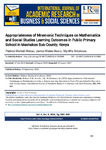Appropriateness of Mnemonic Techniques on Mathematics and Social Studies Learning Outcomes in Public Primary School in Machakos Sub-County, Kenya

View/
Date
2019Author
Makau, Patricia Mwikali
Muola, James Matee
Amukowa, Wycliffe
Metadata
Show full item recordAbstract
The purpose of this study was to investigate the appropriateness of Mnemonic techniques on
mathematics and social studies learning outcomes in primary schools in Machakos subcounty, Kenya. A 4x2 Factorial research design was used to test the appropriateness of three
Mnemonic techniques on learning outcomes of mathematics and social studies. Stratified
sampling technique was used to categorize schools into three educational zones in Machakos
Sub-County. Four schools were then purposefully selected which had similar mean grades in
KCPE exams from the three zones. Random sampling was used to assign experimental and
control groups. A sample size of 317 class 7 pupils were selected for the study. The following
instruments were: Tests which were used to measure learning outcomes of mathematics and
social studies. Observation schedule which were as a monitoring tool during Mnemonic
techniques intervention process. Questionnaires which were used to measure reported
enjoyment and satisfaction among learners during Mnemonic techniques intervention
process. Piloting was done in Kathiani Sub-County. Validity and reliability of the research
instruments was determined by the split-half correlation method. One-way ANOVA was used
to analyse the data. Post-hoc pairwise comparison (LSD) was performed to establish which
groups were responsible for the differences. The main findings of the study were: No
significant differences (F(3,147)= 0.052, P< 0.05) were found in mathematics learning
outcomes between learners using the three Mnemonic techniques. Hence none of the three
Mnemonic techniques was found to be more appropriate for mathematics. In social studies,
significant differences (F(3,146) = 4.25, P< 0.05) were found between learners using the three
Mnemonic techniques. Music Mnemonic technique was most appropriate for social studies
pegword, keyword and control group were second, third and fourth respectively.
Recommendations of this study was; The findings of this study were based on mathematics
and social studies, in order to further contribute to the understanding of the relationship(s)
between Mnemonic techniques and learning outcomes a similar study should be replicated
in other subjects.
Collections
- School of Education [203]
